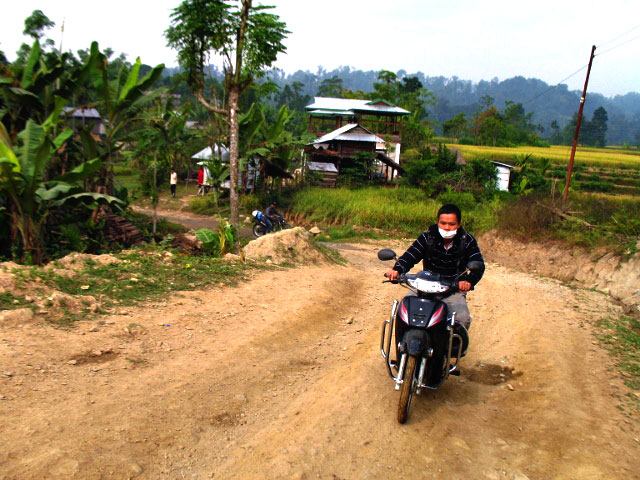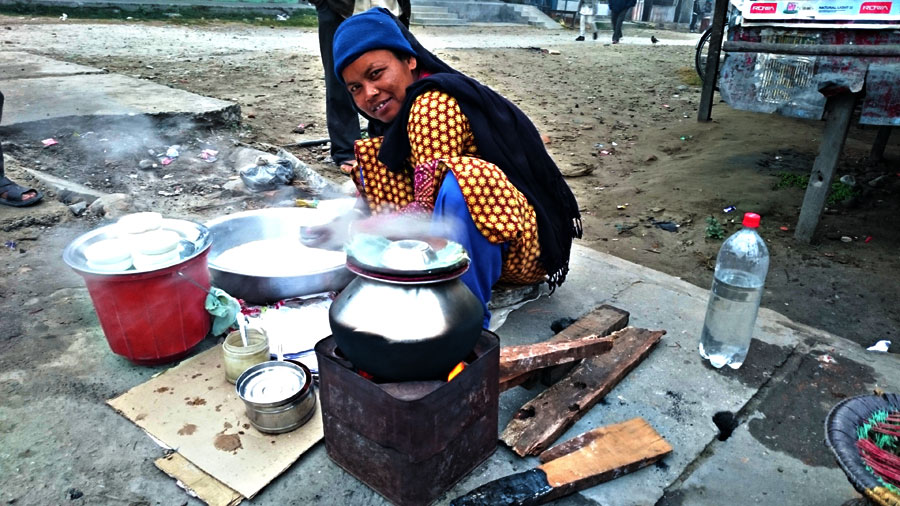.
How long have you lived overseas?
I have been living abroad since September 2006, close to 10 years. I try to come back to the U.S. about once a year to see my parents and siblings.
In 2006 I was hired in the U.S. to go Viet Nam to work as a case worker and interpreter for the International Organization for Migration (IOM), an intergovernmental organization. In Viet Nam my job was to prepare the files of these former South Viet Nam veterans and the U.S government then sent officers to interview and approve/deny these claims. This program closed in 2010 but I left in 2008 to fill an vacant spot in Nepal, also with IOM. Here in Nepal we prepare the files of UNHCR approved Bhutanese refugees for the U.S. and other resettlement countries. Once these countries interviewed and approved the refugees, we follow up with medical screening as per requirement of each country and other formalities such as obtaining exit permits, book flights for them to fly to their country of destination. Currently I oversee a fleet of buses and cars, drivers and field assistants and bring refugees from the camps to our compound for the various resettlement screening steps (such as medical screening, vaccination, counseling, etc..) in the morning and drive them back to the camps in the evening. I also plan their domestic flights (either via commercial or charter) so that they can catch their international flights. Lastly I arrange airport pickup/drop off for office staff coming here or leaving the area for work.
I haven't escaped from the US permanently, but only living abroad temporarily. It's likely that I will have to return when my two kids are older and ready for middle school.
What made you decide to leave the US?
I have had a healthy dose of curiosity ever since I was little, a need to see and be part of a different culture. After getting a taste of life outside the U.S on a study-abroad program in China for my undergrad, I looked for ways to live overseas, especially in Viet Nam where I still have a lot of relatives. It took me two years and 3 months after graduating from college to find a job in Viet Nam. While searching for a job abroad I spent a year working as an intern in the U.S, then I stayed with my grandma in Viet Nam for about 6 months, living on my relatives and family members' goodwills (and some monetary donation). I also worked as a curtain-maker/seller in California for 4-5 months.
What do you miss about not being in the US?
I miss the quietness of the streets in Minnesota, where I am from, and the library system. The noise level in places I have been in Asia range from high to ear splitting. In Nepal there are special ceremonies all the time (weddings, memoriam, religious blessing) and whoever hosting the event would blast music and religious prayer from morning until 10-11 pm. Viet Nam has the noisy traffic going at all hours. After a while your ears filter out the noises and for the particularly loud celebration, I plug in my noise-canceling headphones (really useful to keep your sanity). I also miss being able to go to a library and borrow books, or wait for a week or two for an inter-library loan book to come. Nepal and Viet Nam don't have a developed public library system like that of Minnesota specifically and the U.S as a whole. To keep reading while living abroad, I resort to borrow and trade books among friends, or occasionally buy a Kindle e-book. Vietnamese books can be easily found as PDFs on the Internet.
What are the challenges of living where you are as a foreigner?
I am a Vietnamese-American so caste conscious Nepalese see me as one of the hill tribes and ALWAYS so surprise when they found out I can't speak Nepali beyond ordering food, buying vegetables, and asking for direction. Then you see someone fitting a description of a foreigner and people go out of their way to "make" that person feel at home. On the plus side, I don't get gouge when buying things in the market and no one bothers me when I just sit on the side and observe the local's rhythm. We have daily 8-10 hours power outage, the electrical fluctuation wear out my electrical devices quickly. During the monsoon season everything floats up on the street. During the winter season the air is acrid with burnt garbage. Drivers follow their own rules and disregards road rules.
What are some of the pleasant surprises you've encountered in your new home?
There is no 'organic' label because almost everything here is locally produce or grown. Meat is literally still warm when I go out and buy, food is not kept frozen simply because of the lack of electricity and people just buy enough to cook for the day. My cost of living is much lower here than in the U.S. I don't miss TV shows at all and I have more free time here. When I go back to visit in the US I always feel like I don't have enough time in a day yet I don't accomplish anything. I don't know where my time went. I get to meet and talk to people daily and spontaneously wherever I travel whereas in the States you have to make plan, arrange meeting, confirm time and location etc...Just extra layers we add to our lives that are really unnecessary.
What are some of the unanticipated problems?
Nepalese government is still in transitional power sharing stage at the capital so law enforcement in the peripheries are relatively weak. Strikes and protests can and do shut down commerce and ability to get household items here. Education for children is expensive outside of the U.S., especially in Asia where parents are willing to go to great length to educate and give an edge to their children. Good vaccines are hard to find where I am so do vaccinate fully before you leave the U.S.
What are some advices you have for Americans who also want to get out?
There is a Vietnamese saying: Đi một đàng học một sàng khôn "Take off in one direction, acquire a basketful of knowledge." Travel and stay for an extended time outside your community and see how people perceive and do things differently. If there are things you like then borrow and adapt it for your own lives.
--Son Ha Dinh (32-years-old)
Son Ha, "First photo is of me riding around to explore the surrounding area, which is all rocky hills and river. The second is of a woman selling rice flour cakes by the side of the road. They eat these cakes with salt for breakfast."
Do check out Son Ha's excellent blog, Meander Through Life.
...............................................................................
If you're an American living abroad, please answer the questions above and send them to me: linhdinh99@yahoo.com . I'll post all of your answers on this blog, plus a photo or two if you feel like sending them, and please do tell how you're making money in your new country, and give me your age also. Many thanks in advance!
.


3 comments:
Though Son intends to come back to the US, his various experiences overseas will be very useful whenever he decides to get out again, and even his two kids' exposure to several countries so early in life will help them to navigate the future.
very interesting, like the vietnamese saying. shame how people are (worldwide, though i too noticed it in asia especially) with 'giving their kids an edge'--when we could all cooperate, work towards genuinely liking/loving each other, and make such a beautiful life. it's within our reach, each of ours, but who does it?
I hear you, Larry.
By the way, I just noticed I like that picture of the woman selling rice cakes. It's a good picture and I like her smile.
Post a Comment